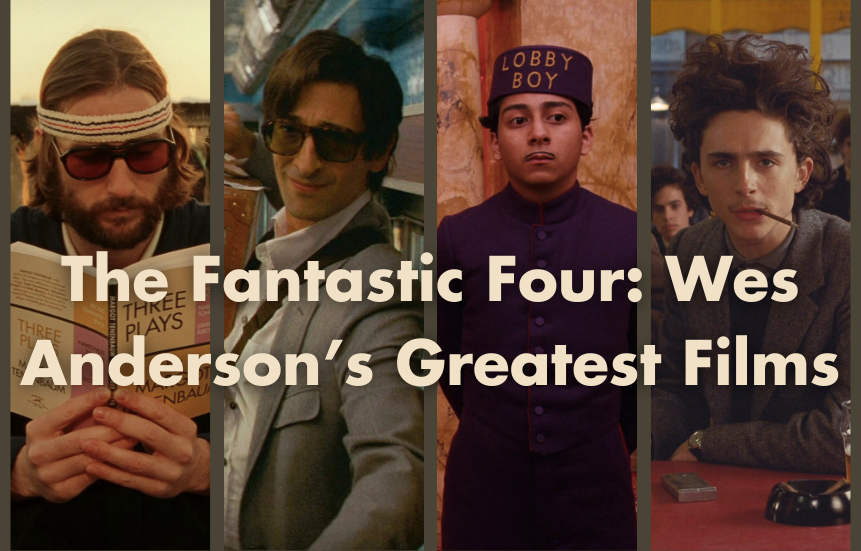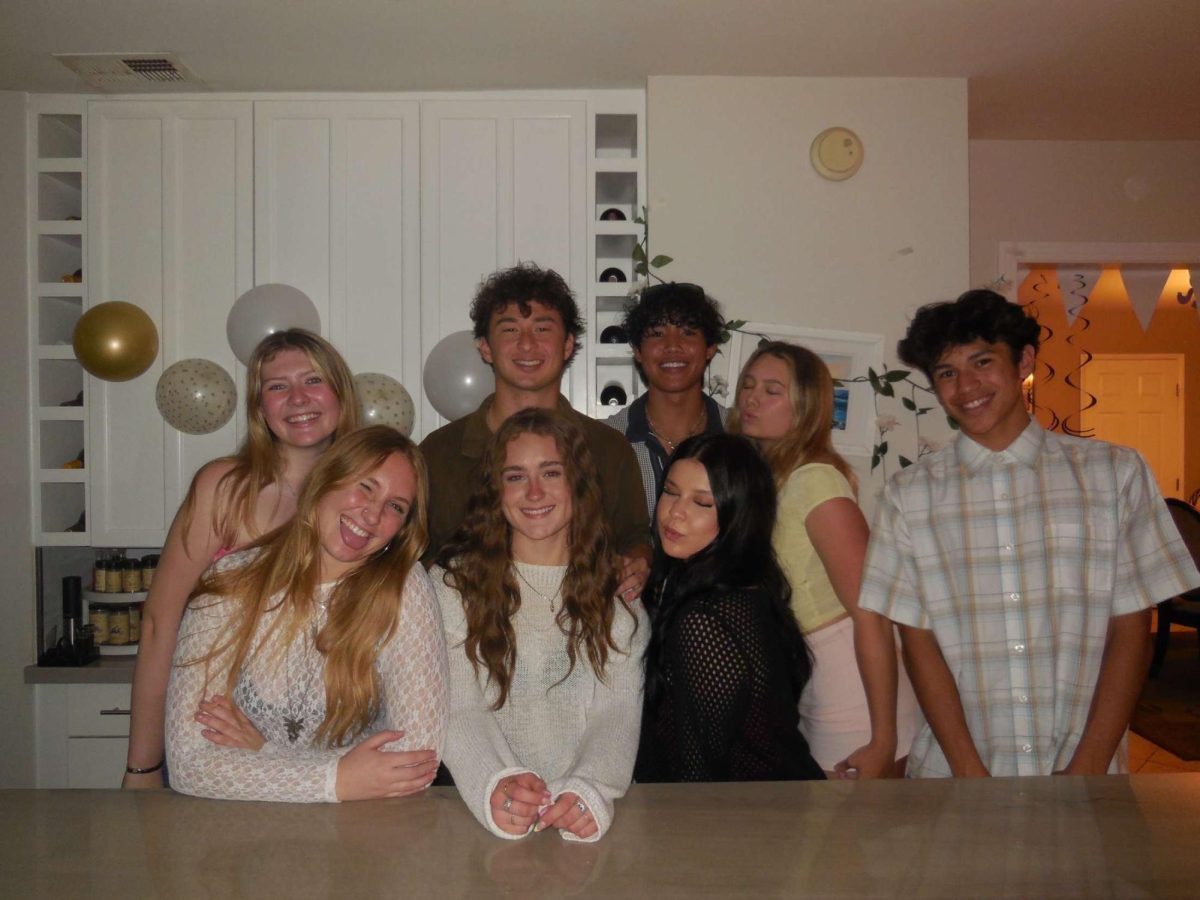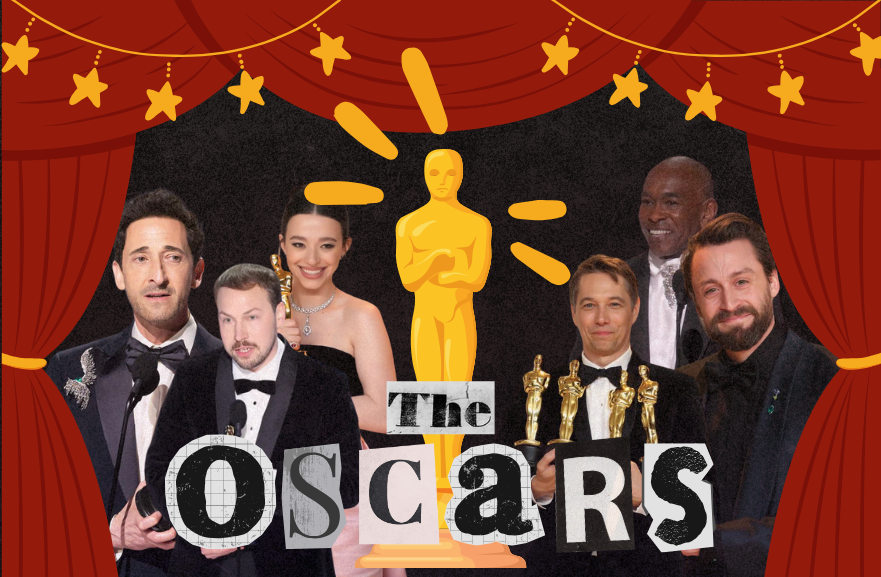Wes Anderson is an American director often talked about on Slick. This time, media critics and resident pedants Tegenn Jeffery and Vada Weisheit aim to break down the whimsy and joy of four more of his films. (“Asteroid City,” “Rushmore” and “Bottle Rocket” have already been written about. “The Life Aquatic of Steve Zissou” was covered in a 2017 print of Slick Magazine, and “Isle of Dogs” was mentioned in THIS column)
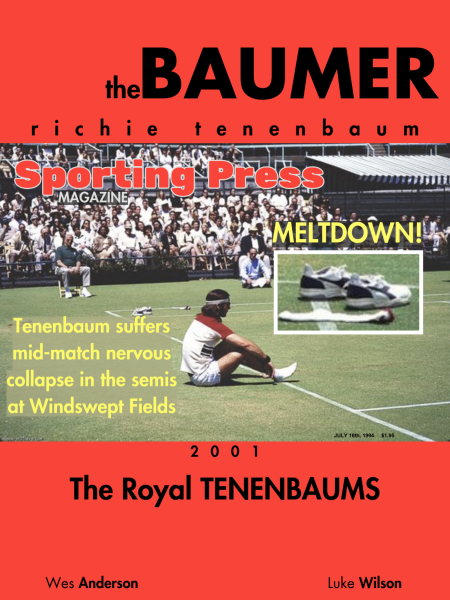
“The Royal Tenenbaums” (2001)
Vada: Out of all the ludicrously stylized movies Anderson has done over the years, “The Royal Tenenbaums” is rather subtly decorated.
Tegenn: I disagree. I know what you’re saying—the colors are less striking—but the style is absolutely there. “Tenenbaums” is one of his most unreal feeling movies, I think mainly because nothing particularly extraordinary happens in it. Unlike some of his other work, “Tenenbaums” is, at a base level, entirely plausible. That’s why the style is so jarring because the way his characters talk isn’t how people really talk, but it’s all relatively normal otherwise.
V: Which makes sense. It’s about this bizarre family and their estranged dynamic, so the real fruit of the film seems to fall completely on the characters’ shoulders in terms of style—it still has that Anderson-flavor.
T: There’s nothing more Anderson-flavored than a whole bunch of sad people filled with ennui and having hobbies. I mean, that’s most of his movies summed up. I like Luke Wilson in this one, as tennis-obsessed, sunglasses-wearing Richie Tenenbaum.
V: Luke Wilson was utterly phenomenal; his entire look and feeble characteristics make him sympathetic towards the audience. Out of all the Tenenbaums, he was by far my favorite, combined with his relationship with Eli Cash (played by Owen Wilson).
T: Not much happens in the movie, if we’re being honest, but that doesn’t mean it isn’t an engaging character study nonetheless. Coming out of this film, I feel like I know these people now. I wouldn’t necessarily call them my friends, but we’ve formed a connection. That’s one of the reasons why I like Anderson’s work so much; most of his characters are personable, regardless of their flaws.
V: Richie is most definitely my best friend.
T: Sure.
V: Truthfully though, it shows how strong of a writer Anderson is because the people are extremely captivating while also seeming realistic and human in nature, despite their quirks.
T: Gwyneth Paltrow plays Margot Tenenbaum beautifully, too. Everyone in the cast seems honed into their characters. Nothing seems out of place, as is Anderson’s style. Another aspect of his style that I’m less keen on is his obsession with portraying vaguely problematic relationships. I didn’t like the incest.
V: Yes, yes. I now want a fur coat, thanks to Margot. It could have been done without the brother-sister thing.
T: Beyond that, I think it’s well done, and as I always say, just because a movie shows bad things doesn’t mean the movie’s bad.
V: We give it a seven and a half stars out of 10!
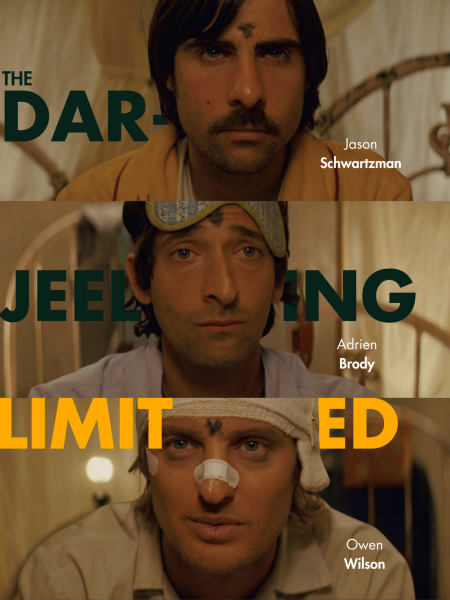
“The Darjeeling Limited” (2007)
V: “The Darjeeling Limited” is by far the most beautiful film I have ever laid my eyes on. The music, the colors, the sets, the heartache…it is cinema at its finest.
T: I love Jason Schwartzman.
V: You know what I love? I love the funeral match cut. Those parallels were unbelievable, probably one of the most gasp-worthy scenes in any Anderson movie.
T: I think I had to pause the movie at that point and calm down for a bit. Even though a lot of the themes are very on the nose in this movie—“I guess I still got a lot of healing to do”—but I think it works. Pretty much every line of this flick is a double entendre, but I don’t mind. In fact, I love it!
V: There were a lot of lines that were just delivered perfectly. I think Anderson nails comedy, but you’ve gotta give it up for the way Schwartzman delivers the line, “I love you too, but I’m gonna mace you in the face!”
T: Normally I act under the assumption that Adrien Brody will give us the best line deliveries, like in “The Grand Budapest Hotel,” but here I have to agree. Schwartzman steals the spotlight. I think this movie is particularly special because for once the typical “Bad Dad” of an Anderson movie is a dead dad and a bad mum.
V: I like that the mom is absent, although her disinterest in her sons makes me sad. On another note, one of my favorite moments is when Owen Wilson’s character Francis tries to order his brother’s meals and gets them to raise their hand like little kids.
T: I think it’s interesting to see how Francis is so obviously inspired by their mum; she does the exact same thing later on. In lieu of an actual parent, the oldest brother has had to become that for his siblings. Even then though, all three of them struggle to grow up.
V: It’s an interesting dynamic, which makes me wish I could have known more about the dad, but I do like the choice of not showing him. They couldn’t have cast Bill Murray, he already had a cameo.
T: Having him open the movie running towards the train was a really funny decision because it makes you think the film’s going to be about him and then boom! He’s irrelevant.
V: Irrelevant, but perfect, just like this movie. “The Darjeeling Limited” gets a whopping nine stars out of 10.
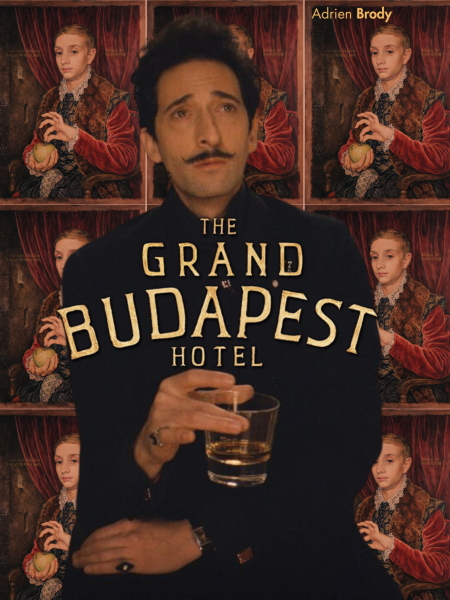
“The Grand Budapest Hotel” (2014)
T: I think if you were to ask people, most of them would say “The Grand Budapest Hotel” is their favorite Wes Anderson movie; it’s by far his most popular.
V: That’s fair, it has all the good stuff: style, comedy, and the Holy Trinity (Adrien Brody, Edward Norton and Jason Schwartzman [in height order])
T: Like any Wes Anderson flick, it’s jam-packed with recognizable actors. I mean, you can’t go five seconds without seeing Willem Dafoe, Owen Wilson, Tilda Swinton, Bill Murray, and Jude Law, just to name a few. Not to mention it stars Ralph Fiennes, Tony Revolori and Saoirse Ronan. It’s a great time!
V: The film’s filled with silly shenanigans that make it as enjoyable as it is. Following an unlikely friendship between boss and bellboy, they go through hell and high water with an alleged stolen painting, arrest and to top it all off, a chase scene takes place in the actual hotel.
T: What more could you want? I think it’s one of the funniest Anderson movies. Every single line that comes out of Adrien Brody’s mouth is absolute comedy-gold. “You’re not getting ‘Boy with Apple,’ you goddamn little fruit!” It’s iconic.
V: “Talk to his club-footed sister again—and, this time: be persuasive.” Seriously, Brody’s line delivery sells it every single time.
T: He’s fantastic, and a stand-out actor every time.
V: That’s true. I also think the idea of this snarky villain dressed in black with a curly mustache is a lot funnier when he’s in the pastel-pink hotel. It’s a very obvious juxtaposition, but Wes Anderson always allows his characters to be one in their own. You’re never going to confuse two characters from any film because they’ve always got their own thing going on. That’s really telling in “Grand Budapest,” it has a lot of life.
T: Oh I adore the juxtaposition! I think “The Grand Budapest” is such a good balance of whimsy and seriousness. The whole plot is goofy, but Brody, and by extension, DaFoe as his sidekick, are so good because their threats are genuinely scary. They’re just two “Godfather”-esque villains stuck in the decadently decorated wedding cake that is “Grand Budapest.” It’s a similar thing with Norton’s character, Henckels.
V: Norton’s entire job, aside from being a police officer, is to just be a silly man. He’s got a twirly mustache and sparkly eyes.
T: The mustaches! That’s what this movie is really about, let’s be honest. Everyone has an amazing mustache.
V: Like Zero’s (the bellboy; played by Revolori) mustache, which he draws on in the mirror.
T: Genius! How does Anderson do it?
V: He picks ideas out of a velvet top hat like a dollar-store magician.
T: Dollar-store? More like designer-exclusive. Anderson is a man who knows how to make things look good. Speaking of which, there’s a gorgeous scene with Ronan backed by the spinning lights of a Ferris wheel.
V: She’s such a gem! If only she were in it more, but alas, she was a more sidelined love interest than most female Anderson leads tend to be.
T: Yeah, I think that’s because this movie is more about adventure than love. That’s a change for Anderson; normally his movies revolve around messed-up relationships (see: “The Royal Tenenbaums”), but this one, not so much.
V: Zero is just in love, and it works out. It’s sweet!
T: All in all, I’d say give “The Grand Budapest Hotel” a solid eight and a half stars out of 10. That’s pretty good!
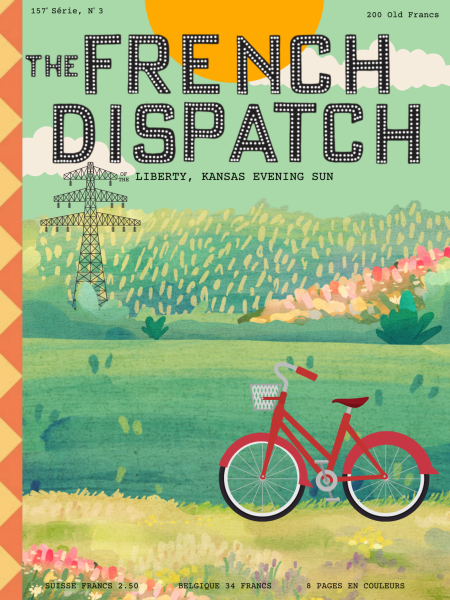
“The French Dispatch” (2021)
T: Fun fact, this movie is what inspired me to join Slick in the first place! It holds a special place in my heart because of that. “The French Dispatch” isn’t like other Anderson movies either, as it chronicles smaller vignettes throughout the larger story. Each part of the film is a different article written by one of the journalists of the newspaper the French Dispatch.
V: If anyone watched that film and didn’t immediately think ‘I want to be a journalist.’ It makes it look unbelievably fun—like Owen Wilson falling off his bike.
T: Every good journalist I know has fallen off their bike at least once, it’s a right of passage. Because of the anthology aspect, opinions on it are going to be more varied than other movies with a single story. Not me though, I love all of them!
V: I love “Revisions to a Manifesto” about a chess-playing group of teenagers desperate for revolution, but I couldn’t care less about “The Private Dining Room of the Police Commissioner,” which follows Roebuck Wright (played by Jeffrey Wright) through a typographic retelling of a kidnapping that results in a culinary discovery featuring Steve Park as Nesscaffer, a chef. It ends with an entirely animated chase scene, but despite that, it wasn’t particularly interesting.
T: I understand! My favorite is “The Concrete Masterpiece,” starring Benicio del Toro, Léa Seydoux and Adrien Brody, and narrated by Tilda Swinton. I always love it when Anderson uses black and white interchangeably with color scenes, and it’s done excellently here. This effect is done in other parts of the movie too, but it works really well in “Masterpiece” specifically.
V: The black and white scenes tend to be jarring because Wes Anderson is widely known for his color. The bright color pallet of the journalists’ office compared to the drab gray tones make this film so memorable.
T: Never in a million years would I describe the black and white as drab, but I know what you mean.
V: Hey, it’s a technically accurate adjective.
T: Sure. I think “The French Dispatch” prioritizes the story over characters, a change from something like “Tenenbaums.” Yes, there are fun characters, but I couldn’t tell you who my favorite is; they’re all just vessels for these meretricious stories.
V: These varied characters are just mediums to tell these intricate stories. I think that’s the reason “Dispatch” is as good as it is. The characters are each so different from one another to emphasize each story being told. They’re each perfectly curated to tell their particular story.
T: They are, and I like that there’s a different story for everyone; it feels like you get to know the journalists of The French Dispatch, and how they work as a community as well as individually.
V: I wish they made a movie like this about us, I’d wear my cool yellow hat.
T: I think I could get away with how I normally dress, but I agree! We hereby give “The French Dispatch” seven stars out of 10.
While these four movies have been chosen as Anderson’s greatest standout films, his entire filmography is quite impressive. As the years trudge by, one is sure to find a bright spot with his rotation of quirky and colorful releases.


